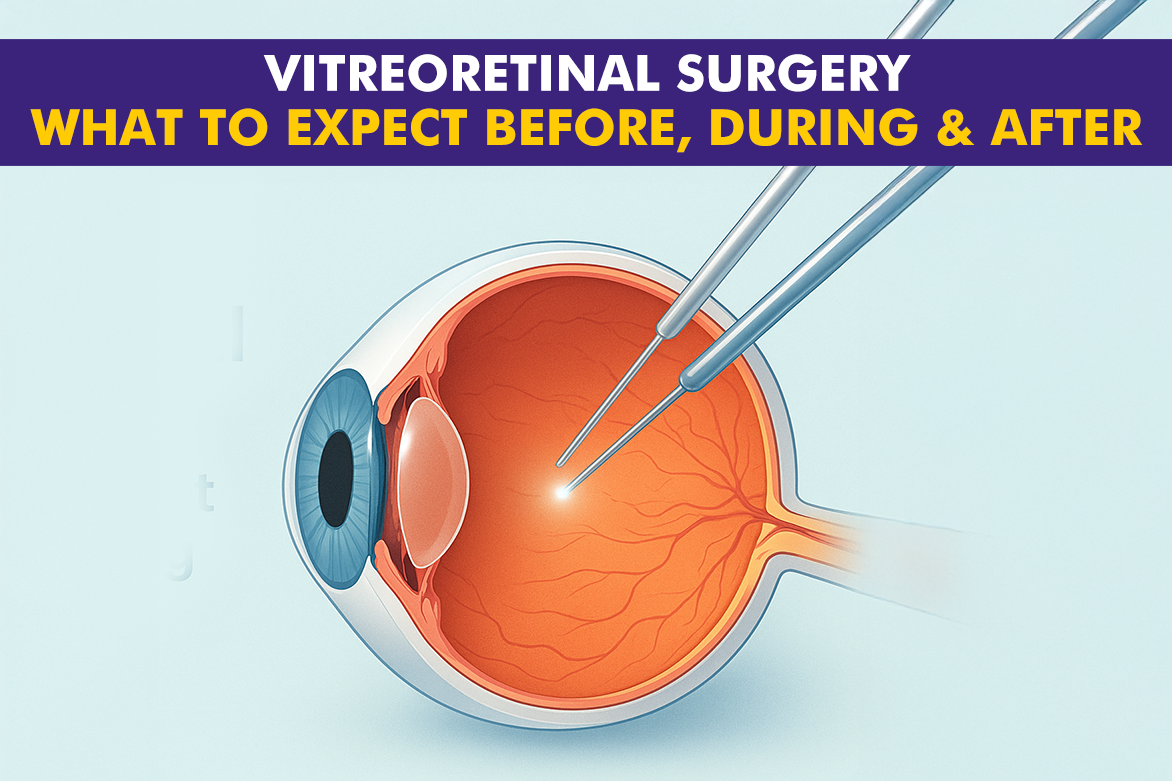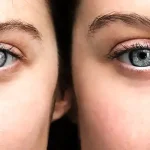Table of Contents
- Common Conditions Treated
- Conditions That May Require Vitreoretinal Surgery
- Pre-Surgery Preparation
- What Happens During Surgery?
- Recovery: Potential Risks and Complications
- Why Follow-Up Care Matters
- Long-Term Outlook
- Final Thoughts
- Frequently Asked Questions
Think of vitreoretinal surgery as precision engineering for your eyes. These are advanced microsurgical procedures targeting two critical parts of your eye: the retina (that light-sensitive tissue at the back) and the vitreous (the clear, gel-like substance filling your eye’s center).
Highly trained retinal specialists perform these intricate eye surgery operations. We’re talking state-of-the-art equipment. Magnification so powerful they can work on tissue thinner than paper. The precision required is extraordinary.
The phrase “retinal surgery” hits differently. It’s one of those words that makes your stomach drop. Your retina is everything – it’s how you read this sentence, recognize your loved ones’ faces, drive safely, work productively. It’s your window to the world.
Just got told you might need vitreoretinal surgery? That mix of confusion, fear, and a thousand questions swirling in your head? Totally normal. You’re not overreacting.
This retinal surgery procedure is cutting-edge medicine at its finest. It has literally changed lives for countless people who were staring down permanent vision loss.
Let’s walk through this together. Everything you need to know about vitreoretinal surgery – what it is, why you need it, how it works, how to prepare, and what vitreoretinal surgery recovery really looks like.
Common Conditions Treated:
- Retinal Detachment Surgery – Your retina literally peels away from the underlying layer. Emergency territory.
- Macular Hole Surgery – A tiny tear right in your central vision zone. Reading becomes impossible.
- Diabetic Retinopathy Surgery – 0High blood sugar damages vessels. They bleed. They leak. Scar tissue forms.
- Vitreous Hemorrhage Surgery – Blood leaks into that clear gel inside your eye. Vision clouds dramatically.
- Epiretinal Membrane Surgery – Think of it as scar tissue that wrinkles your retina. Distorts everything you see.
These retinal surgeries don’t just preserve existing vision. Often, they dramatically improve it. Especially when daily life has become a struggle.
Conditions That May Require Vitreoretinal Surgery
Vitreoretinal surgery gets recommended when vision loss becomes imminent. Or when other treatments have reached their limits.
Your eye doctor might suggest this procedure if you’re dealing with:
- Retinal tears or retinal detachment – Time is critical here
- Severe diabetic eye complications – When medical management isn’t enough
- Macular holes or macular puckers – Central vision damage
- Persistent vitreous bleeding – Vision obstruction that won’t clear
- Eye trauma or infections – Damage requiring surgical repair
Important note: This decision is made by a vitreoretinal specialist. After careful evaluation usually following advanced imaging tests. They don’t recommend surgery lightly.
Pre-Surgery Preparation
Once vitreoretinal surgery is scheduled, preparation becomes crucial. Your safety and optimal surgery outcomes depend on proper prep work.
What This Typically Involves:
- Comprehensive retinal examination – Including specialized imaging like OCT and fluorescein angiography
- Medical optimization – Blood sugar and blood pressure control, especially for diabetic patients and hypertensive patients
- Pre-operative fasting – No food or drink for several hours before surgery (usually after midnight)
- Medication adjustments – Particularly blood thinners or chronic condition medications
- Transportation arrangements – You cannot drive yourself home after retinal surgery
These pre-surgery steps might seem overwhelming. They’re standard protocol. Designed to make your surgery day as smooth as possible.
The Night Before Surgery
Anxiety peaks here. Completely normal. Try to get some rest. Your surgical team has done this countless times. For them, it’s routine precision work.
What Happens During Surgery?
The actual vitreoretinal surgery procedure often feels less intimidating than people imagine. Here’s the reality:
Anesthesia for Retinal Surgery
Most vitreoretinal surgeries use local anesthesia with mild sedation. You’re comfortable. Relaxed. Maybe drowsy. But no pain.
The Surgical Steps:
- Vitrectomy procedure – Removing the vitreous gel to access your retina for treatment
- Retinal repair – Laser therapy or cryotherapy (freezing) to seal retinal tears
- Retinal reattachment – Using gas bubbles, air, or silicone oil to hold everything in place
Surgery Timeline
Most vitreoretinal surgery procedures last 30-90 minutes. Depends on complexity. Time moves differently when you’re anxious, but your surgeon works at the right pace.
You’ll head home the same day. You will have an eye patch in place. Clear post-operative instructions in hand.
Recovery: Potential Risks and Complications
Vitreoretinal surgery recovery matters as much as the surgery itself. Everyone’s journey differs slightly, but here’s what’s typical:
First Few Days After Surgery
Expect mild discomfort. Gritty sensation. Some redness around your eye. This is normal healing after retinal surgery.
Your vision will be blurry initially. Especially with a gas bubble present. Don’t panic – this is expected during retinal surgery recovery.
Positioning Requirements After Surgery
Depending on your specific surgery, you might need special positioning. Face-down for days. It’s exhausting but essential. The bubble needs gravity’s help.
Post-Surgery Medication Routine
Prescription eye drops become your new routine. Multiple times daily. They prevent infection and reduce inflammation. Don’t skip doses.
Activity Restrictions After Retinal Surgery
No eye rubbing. No swimming. No heavy lifting. No bending over. These restrictions have purpose – protecting your investment.
Return to Normal Life
Most people gradually resume light activities. Many return to work within 2-4 weeks. Physical jobs take longer recovery time. Vision improvement after vitreoretinal surgery happens slowly. Patience becomes your greatest asset. Having someone help those first few days? Game changer. Both practically and emotionally.
Potential Risks
Every surgery carries risks. Vitreoretinal surgery procedures included. The encouraging news? Most complications are rare. When caught early, usually manageable.
Possible Vitreoretinal Surgery Complications:
- Bleeding or infection – Rare but requires immediate attention
- Cataract development – More common in older patients after retinal surgery
- Retinal re-detachment – May require additional surgery
- Increased eye pressure – Could lead to glaucoma
- Vision loss – Extremely rare when complications are properly managed
Close post-operative follow-up allows early detection. Quick intervention when needed.
Why Follow-Up Care Matters
Your vitreoretinal surgery journey continues well after surgery. Post-operative care is absolutely critical for long-term success.
Follow-Up Timeline:
- 1-2 days post-surgery – First clinic visit checking pressure, healing, retinal position
- Weekly visits initially – Monitoring recovery progress closely
- Monthly check-ups – Ensuring continued stability
- Additional treatments – Sometimes laser therapy, injections, or secondary surgery needed for complex cases
These appointments aren’t optional. They’re insurance policies for your vision. Worth every single visit.
Long-Term Outlook
“Will I see clearly again?” Everyone asks this question about vitreoretinal surgery outcomes. Honest answer: It depends. Several factors matter most – how severe your retinal condition was, how long it existed before treatment.
Realistic Expectations:
- Vision typically improves over weeks to months after retinal surgery
- Some patients recover completely while others maintain functional improvement
- Early surgery yields better outcomes – emphasizing timely treatment importance
- Vision stabilization often happens even when complete restoration isn’t possible
The biggest win? This surgery frequently preserves existing vision. Prevents further deterioration. Gives many patients a real chance at visual improvement.
Final Thoughts
Vitreoretinal surgery represents one of modern ophthalmology’s greatest success stories. Yes, it sounds complex. Because it is complex. But in the hands of an experienced specialist, it’s vision-saving medicine at its finest. These procedures tackle conditions considered untreatable just decades ago. They offer hope where none existed before.
If you or someone you love is preparing for this surgery, you’re not alone. Millions have walked this path successfully. With the right team, proper preparation, and committed aftercare, you have excellent chances for successful recovery.
The decision for surgery is never easy. The process is never simple. But for serious retinal conditions, it often represents the difference between sight and blindness. Between independence and dependence. Between hope and despair.
Trust your surgical team. They’ve recommended this path because they believe in successful outcomes. Trust the process. Trust your own resilience. Your vision is worth fighting for. This surgery is that fight.





